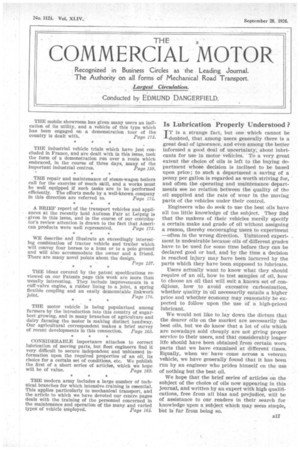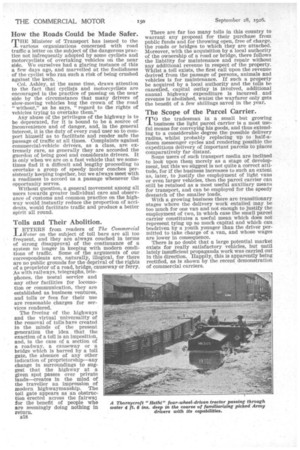Is Lubrication Properly Understood ?
Page 35

Page 36

If you've noticed an error in this article please click here to report it so we can fix it.
TT is a strange fact, but one which cannot be 'I-doubted, that among users generally there is a great deal of ignorance, and even among the better informed a good deal of uncertainty, about lubricants for use in motor vehicles. To a very great extent the. choice of oils is left to the buying department whose decision is inclined to be based upon price ; to such a department a saving of a penny per gallon is regarded as worth striving for, and often the operating and maintenance departments see no relation between the quality of the oil supplied and the rate of wear in the moving parts of the vehicles under their control.
Engineers who do seek to use the best oils have all too little knowledge of the subject. They find that the makers of their vehicles merely specify a certain make and grade of oil without assigning a reason, thereby encouraging users to experiment —often in the wrong direction. Untutored experiment is undesirable because oils of different grades have to be used for some time before they can be declared good or bad, and by the time a decision is reached injury may have been incurred by the parts which they have been supposed to lubricate.
Users actually want to know what they should require of an oil, how to test samples of oil, how to choose an oil that will suit a known set of condktions, how to avoid excessive carbonization, whether quality in oil necessarily entails a higher price and whether economy may reasonably be expected to follow upon the use of a high-priced lubricant.
We would not like to lay down the dictum that the dearer oils on the market are necessarily the best oils, but we do know that a lot of oils which are nowadays sold cheaply are not giving proper service to their users, and that considerably longer life should have been obtained from certain worn parts that we have examined at different times. Equally, when we have come across a veteran vehicle, we have generally found that it has been run by an engineer who prides himself on the use of nothing but the best oil.
We hope that the brief series of articles on the subject of the choice of oils now appearing in this journal, and written by an expert with high qualifications, free from all bias and prejudice, will be of assistance to our readers in their search for knowledge upon a subject which may seem simple, lint isfar from being so.
How the Roads Conld be Made Safer.
THE Minister of Transport has issued to the various organizations concerned with road traffic a letter on the subject of the dangerous practice not infrequently adopted by some cyclists and motorcyclists of overtaking vehicles on the near side. We ourselves had a glaring instance of this a few days ago, and marvelled at the foolishness of the cyclist who ran such a risk of being crushed against the kerb. Col. Ashley, at the same time, draws attention to the fact that cyclists and motorcyclists are encouraged in the practice of passing on the near side by the circumstance that many drivers of slow-moving vehicles hug the crown of the road "without," as he says, "regard to the rights of vehicles trying to overtake them." Any abuse of the privileges of the highway is to be deprecated, for it is bound to be a source of inconvenience and of danger, and, in the general Interest, it is the duty of every road user so to comport himself as to facilitate and render safe the passage of traffic at all times. Complaints against commercial-vehicle drivers, as a class, are extremely rare, as generally they are accorded the guerdon of being good and considerate drivers. It Is only when we are on a fast vehicle that we sometimes find it a difficult and lengthy proceeding to overtake a group of speedy motor coaches persistently keeping together, but we always meet with a readiness to accord us a passage whenever the opportunity serves. Without question,a general movement among all users towards greater individual care and observance of customs and common practice on the highway would instantly reduce the proportion of accidents, would facilitate traffic and produce a better spirit all round.
Tolls and Their Abolition.
L'ERS from readers of The Commercial Motor on the subject of toll bars are all too frequent, and they are always couched in terms of strong disapproval of the continuance of a system no longer in keeping with modern conditions of traffic. Some of the arguments of our correspondents are, naturally, illogical, for there are no public grounds for the deprival of the rights of a proprietor of a road, bridge, causeway or ferry. As with railways, telegraphs, telephones, the postal service and any other facilities for locomotion or communication, they are established as business ventures, and tolls or fees for their use are reasonable charges for services rendered. The freeing of the highways and the virtual universality of the removal of tolls have created in the minds of the present generation the idea that the exaction of a toll is an imposition, and, in the ease of a section of a roadway, a causeway or a bridge which is barred by a toll gate, the absence of any other indication of proprietorship—any change in surroundings to suggest that the highway at a given spot passes over private lands—creates in the mind of the traveller an impression of modern highwayrnanship. The toll gate appears as an obstruction erected across the fairwa3 for the benefit of people who are seemingly doing nothing in return. al.8 There are far too many tolls in this country to warrant any proposal for their purchase from public funds and for throwing open, free of charge. the roads or bridges to which they are attached. Moreover, with the acquisition by a local authority of the ownership of a road or bridge, there follows the liability for maintenance and repair without any additional revenue in respect of the property. Whilst a toll exists, the first call upon the revenue derived from the passage of persons, animals and vehicles is for maintenance. If such a property be acquired by a local authority and the tolls be cancelled, capital outlay is involved, additional annual highway expenditure is incurred and revenue is abolished, whilst the wayfarer only gets the benefit of a few shillings saved in the year.
The Scope of the Parcel Carrier.
MO the tradesman in a small but growing 1 business the light parcel carrier is a most useful means for conveying his goods, and thus extending to a considerable degree the possible delivery radius, whilst probably replacing up to half-adozen messenger cycles and rendering possible the expeditious delivery of important parcels to places comparatively far distant. Some users of such transport media are inclined to look upon them merely as a stage of development, but this we suggest is not quite a correct attitude, for if the business increases to such an extent as, later, to justify the emploYment of light vans or even larger vehicles, then the parcel carrier can still be retained as a most useful auxiliary means for transport, and can be employed for the speedy despatch of the smaller loads. With a growing business there are transitionary stages where the delivery work entailed may be too much for one van and not enough to justify the employment of two, in which ease the small parcel carrier constitutes a useful mean which does not represent tying up so much capital and which can beitdriven by a youth younger than the driver perMiffed to take charge of a van, and whose wages are lower in consequence. There is no doubt that a large potential market exists for really satisfactory vehicles, but until lately insufficient propaganda work was carried out in this direction. Happily, this is apparently being rectified, as is shown by the recent demonstration of commercial carriers.




































































































